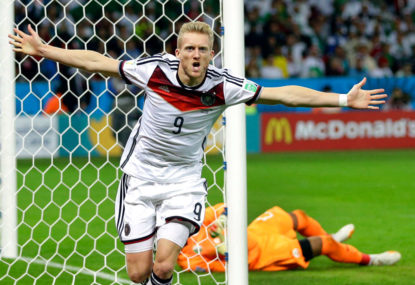Controversy as Villa keeper handed second yellow for shootout crowd taunting... but isn't sent off
Emi Martinez was saved by a new rule that resets yellow cards at the end of extra time, meaning his second yellow for taunting…

As the German squad celebrates their fourth World Cup triumph and first since 1990, we should all take some time to reflect on what has been a remarkable journey.
At times spectacular, Germany weaved their magic throughout the entire tournament. They fully deserve this trophy.
Not only have they showed the world how to play football at this tournament, they’ve shattered the myth that European teams can’t win a World Cup in the Americas. Their set-up and style is likely to be a template for years to come.
This triumph however is more than just a fleeting victory in time. Germany’s win is the end result of a revolution, 10 years in the making.
After their win at Euro 96, German football went into a period of stagnation.
A lacklustre 1998 World Cup was followed by a humiliating defence of their European title in 2000 where the side finished bottom of their group without a win.
A World Cup final appearance in 2002 masked the fact that they were embarrassed 5-1 by England in the group stage and had to make the tournament via a playoff for the first time in their proud history.
Rock bottom came at Euro 2004 where the Rudi Voller-coached side exited at the group stage, with an uninspiring effort by an ageing squad condemning them to a place in the football wilderness.
At this point, the German hierarchy – led by local legend Franz Beckenbauer – conducted an internal review that showed their system was failing.
Youth development was poor, the German game style was out-dated, its biggest clubs were suffering due to financial irresponsibility and the future looked bleak unless there was a change in thinking.
Faced with the options of revolution or stagnation, the German FA chose the former and implemented a radical agenda overhaul and reinvent football in their nation.
The first step was implementing strict financial regulations on club football to prevent the professional league from going out of existence, along with promoting the value of German players.
It also appointed former German striker Jürgen Klinsmann as national coach with a mandate to redefine how football was played in the fatherland.
Along with current manager Joachim Low, the two cast off the dour machine-like tactics of previous German sides in favour of a possession-based attacking game plan built around a batch of young players who had been on the fringe prior to 2004.
Finally and probably most importantly, Germany radically overhauled their youth development program, with all Bundesliga clubs ordered to operate an academy that promoted young German talent.
It extended the Young Talent Program that was introduced in 2002, with the new program helping to propel the careers of Philipp Lahm, Bastian Schweinsteiger and Lucas Poldolski, all three playing a role in winning this year’s tournament.
Results were slow at first, before a surprise run to the semis at the 2006 World Cup signalled that the revolution was indeed working.
Further signs of improvement came in 2009 when Germany, who hadn’t won anything at Youth level since 1992, was the simultaneous holder of all three UEFA Youth Championships (U17, U19, and U21).
The U21 side featured Manuel Neuer, Jermone Boateng, Sami Khedira and Mesut Ozil, while a young Mario Goetze would star for Germany in the U17 tournament.
Also developing in this period were Julian Draxler, Toni Kroos and Andre Schurrle.
These players were further integrated into the German senior side while young and they almost stole the show at the 2010 World Cup with a dazzling performance that was ended by the more experienced Spanish side in the semi-finals.
Meanwhile, at club level, German clubs were actively promoting home-grown talent into senior positions and success began to flow.
During the 2012-2013 season, all seven German clubs in European competition made it past the Group stage with an all-German Champions League final the crowning achievement.
18 of the 34 players selected for the two sides were of German nationality, an ironic fact considering the match was played in the youth development-challenged nation that is England.
A surprise semi-final defeat to Italy at Euro 2012 did not dampen the enthusiasm surrounding the developing side, with most pundits confident of a successful tournament at Brazil.
The Germans have shown that results like this don’t happen overnight, nor do they rely on dumb luck.
Their conquest of the 2014 World Cup has come about due to meticulous preparation, patience and hard work.
Germany’s victory is the grand triumph of a project 10 years in the making. Judging by the quality of their squad, it may not be the only trophy that the system produces.